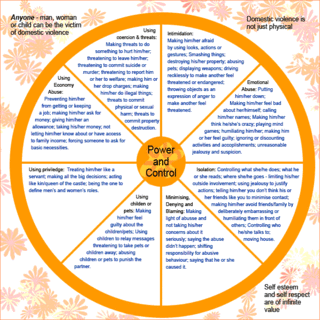Domestic Violence
How to Help Someone in an Abusive Relationship
The best strategies for helping loved ones in abusive intimate relationships.
Posted October 17, 2015 Reviewed by Lybi Ma
In my book Unhealthy Helping, I emphasize that well-intended intervention isn’t enough to effectively help others, and some forms of helping are subject to backfire. This is especially true when it comes to helping friends or loved ones experiencing domestic violence.
October is National Domestic Violence Awareness Month in the United States and a good time to think about how to best help a friend or relative in an abusive intimate relationship. Although U.S. government data indicate that domestic violence has declined by approximately 67 percent since 1994, millions of people experience it every year with far-ranging negative costs to individuals, families, businesses, and society.
Victimization by current or former spouses, boyfriends, or girlfriends is a type of domestic violence called intimate partner violence (IPV) which involves the use of physical or psychological aggression to gain and maintain power and control over a relationship partner. IPV may include physical abuse, sexual abuse, and emotional abuse. Sexual violence, like forcing a relationship partner to engage in sexual acts, and psychological aggression like belittling and threats, are forms of IPV. IPV may continue after a relationship ends. For example, stalking by an ex-partner is a form of IPV. Because intimate partner violence cuts across all groups (young to old, straight to gay, rich to poor, men and women) it’s likely that someone you care about will experience it.[1]
Caution is warranted when trying to help IPV victims in leaving an abusive relationship because intervention is potentially dangerous to you both. You also have to proceed sensitively and respectfully. Otherwise, your sound advice is likely to be rejected and a relationship wall erected between you and the victim.

IPV victims already feel badly about themselves and their situation. This is why IPV experts advise us to be non-judgmental when providing support to IPV victims. There are many reasons why people stay in abusive intimate relationships, including threats of harm, for the sake of the children, economic dependency, social status, unacceptability of divorce, immigration status, “honeymoons” where things are okay, love, and hope that things will change.
It’s good to remember that it’s not just a simple matter of leaving, and if they feel ashamed or embarrassed because of your reactions, they’re likely to get defensive and stop sharing with you, and may even cut off the relationship with you. Remember too that they may decide to stay at least temporarily, and if they think you disapprove, they may distance from you. It’s best to not to cut the lines of communication with your judgment.
It’s alarming when someone you care about is being abused and you may be tempted to launch a rescue and take charge to get your friend or loved one “out.” But people who are abused and controlled by their intimate partner don’t respond well to helpers that try to “boss them” into immediate action. Experts say that’s because it can feel like more abuse and control. Pushing them to do something they’re not ready to do or don’t feel safe doing, may only lead them to avoid you.
So how can we effectively help? Experts suggest telling them, gently and without judgment, that you’re concerned for their safety (or emotional or physical health). Listen, believe them, and say: “I’m sorry this is happening to you.” “I know it’s complicated.” “It’s not your fault.” “You don’t deserve this.” “This doesn’t change how I feel about you.”
Because unsolicited intervention can feel disrespectful and controlling, it’s best to tread carefully. Victims must make their own decision to leave or take action, such as reporting stalking to authorities. To gently push them in that direction it’s best to ask questions: “Are you open to getting medical attention, calling a hotline, reporting the stalking, going to the police, talking to an attorney?" Avoid telling them what they must do.
You can offer help but it should be their choice whether or not to take you up on it. (Exception: Call 9-1-1 if you witness violence.) Ask what you can do to help. Say: “You’re not alone. People care about you and want to help,” “What can I do?” “Do you want me to identify resources, go with you, watch your kids so you can get help?”
Check on your friend frequently but be aware that the abusive partner may read your friend or loved one’s texts, phone messages, and emails and may listen in on conversations. Choose your words carefully until you’re sure it’s safe to talk. When calling, ask: “Is now a good time to talk?” You don’t want to endanger your loved one or your ability to provide support. If the abuser thinks you’re against them, they may demand an end to your relationship with the abused, or target you.
The other thing you can do is plant the seeds of change by gently telling them that expert help and guidance is available: “This happens to a lot of people. Help is available when you’re ready.” Empower them with the tools to act when they’re ready. For example, share resources. Encourage them to memorize the National Domestic Violence Hotline (1-800-799-SAFE) or the local domestic violence shelter phone number in case things worsen. Ask them where they’d go if they had to leave and suggest they develop a safety plan (a practical plan that includes ways to stay safe while in a relationship, planning to leave, or after leaving).
The National Domestic Violence Hotline will help individuals develop plans that fit each situation. Helping others doesn't mean taking over to solve their problems. In fact, that's often not very helpful at all. For an intervention to be effective, we often have to tame our impulse to rescue and instead offer emotional support and tools for empowerment. This is especially true when it comes to intimate partner violence.
References
[1] This isn’t to say that rates aren’t higher for some demographic groups than others. In the US, Native Americans have higher rates of IPV as do people aged 18-24. Women also experience higher rates of IPV. In comparison to men, they are also more likely to be killed by an intimate partner.
Here are some resources you might recommend to friends or relatives in abusive relationships:
National Coalition Against Domestic Violence
National Domestic Violence Hotline at 800-799-SAFE (7233) or 800-787-3224 (TDD)
RAINN (Rape Abuse National Network)
Stalking Resource Center (a program of the National Center for Victims of Crime)
WomensLaw.org (information on restraining orders)
For more on the fine art of healthy helping and giving relationships, see my book . Also available for Kindle, Nook, Kobu, and iBook e-readers.
For my other blogs on the topic of healthy/unhealthy helping and giving see:
When Good Intentions Aren’t Enough
Are You A Codependent Beast of Others’ Burdens?
How Helping A Friend Can Go Horribly Wrong
12 Signs You’re Giving Too Much
Does Codependence Run In Your Family?
Codependent and Unhealthy Helping Mindtraps
Personality and Relationships Made In Codependence Hell




